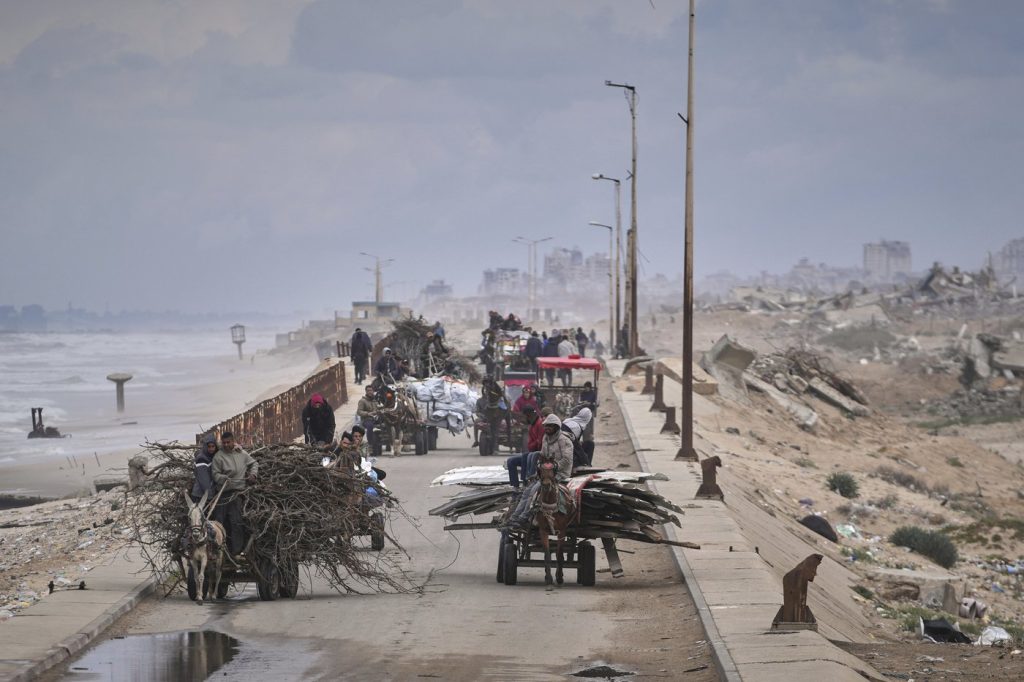BEIRUT, Lebanon (AP) — Tensions escalated between Israel and Lebanon following an early morning rocket attack on Saturday, which Israel attributed to hostile elements in Lebanon. In response, Israel announced it would take severe actions against any threats to its northern territories, specifically targeting the Israeli town of Metula. This incident marks the second time rocket fire has crossed the border since December, raising alarms about the potential breakdown of the fragile ceasefire with the Lebanese militant group Hezbollah.
Hezbollah has been actively launching rockets and drones into Israel since the commencement of hostilities following Hamas's surprise attack on October 7, 2023. The conflict escalated dramatically into full-scale war by September 2024, characterized by extensive Israeli airstrikes that resulted in the death of many senior Hezbollah officials. The ongoing warfare has claimed over 4,000 lives in Lebanon and displaced approximately 60,000 people in Israel.
The ceasefire agreement enacted in November initially required Israeli forces to withdraw from occupied Lebanese areas by late January 2025, with a revised deadline of February 18 later established. However, as of this date, Israeli military presence persists in five locations within Lebanon neighboring Israeli civilian communities, alongside numerous airstrikes on southern and eastern Lebanese regions, which Israel claims were directed at Hezbollah targets. The Lebanese government has actively sought support from the United Nations to compel Israel to complete its withdrawal.
Israel's Defense Minister, Israel Katz, emphasized the country's resolve to prevent any attacks from Lebanon into Israeli territories, stating, “We promised security to the Galilee communities and that is exactly what will happen.” In contrast, Lebanese Prime Minister Nawaf Salam issued a statement urging the Lebanese armed forces to protect the southern border while expressing a desire to avoid a return to war.
On the same day as the rocket incident, Israel reiterated its commitment to increasing military operations in Gaza until Hamas releases the 59 hostages it holds, of whom 24 are believed to still be alive. Israeli forces are reportedly planning new offensives targeting three neighborhoods in Gaza City, while warnings have been issued to civilians to evacuate the area.
In related developments, an Israeli airstrike demolished the only cancer hospital in Gaza, which Israel accused Hamas militants of using as a base. This action has drawn condemnation from international observers and humanitarian organizations. Since the resurgence of hostilities this week, approximately 600 Palestinians have been reported killed, with Israel imposing stringent restrictions on the supply of food, fuel, and humanitarian assistance to the region, aiming to exert pressure on Hamas.
The international community has expressed concern regarding the renewed violence, with the foreign ministers of the United Kingdom, France, and Germany condemning Israel's actions as a significant setback. They urged for an immediate restoration of the ceasefire in light of the rising civilian casualties.
The initial attack by Hamas-led militants on October 7 resulted in around 1,200 fatalities and the capture of 251 hostages. While some have been released in negotiation phases, Israeli forces have conducted rescues for a handful of surviving captives and retrieved bodies of others. The ongoing conflict has seen casualties surpassing 49,000 Palestinians, predominantly civilians, according to figures from the Gaza Health Ministry, while Israel claims to have eliminated about 20,000 militants, though such assertions lack substantiated evidence.
Overall, the situation in the region remains precarious, with rising tensions between Israel and Lebanon, coupled with the ongoing military campaign in Gaza complicating humanitarian conditions and increasing international scrutiny. The complexities of this conflict underline the urgent need for diplomatic efforts aimed at establishing a durable peace.










